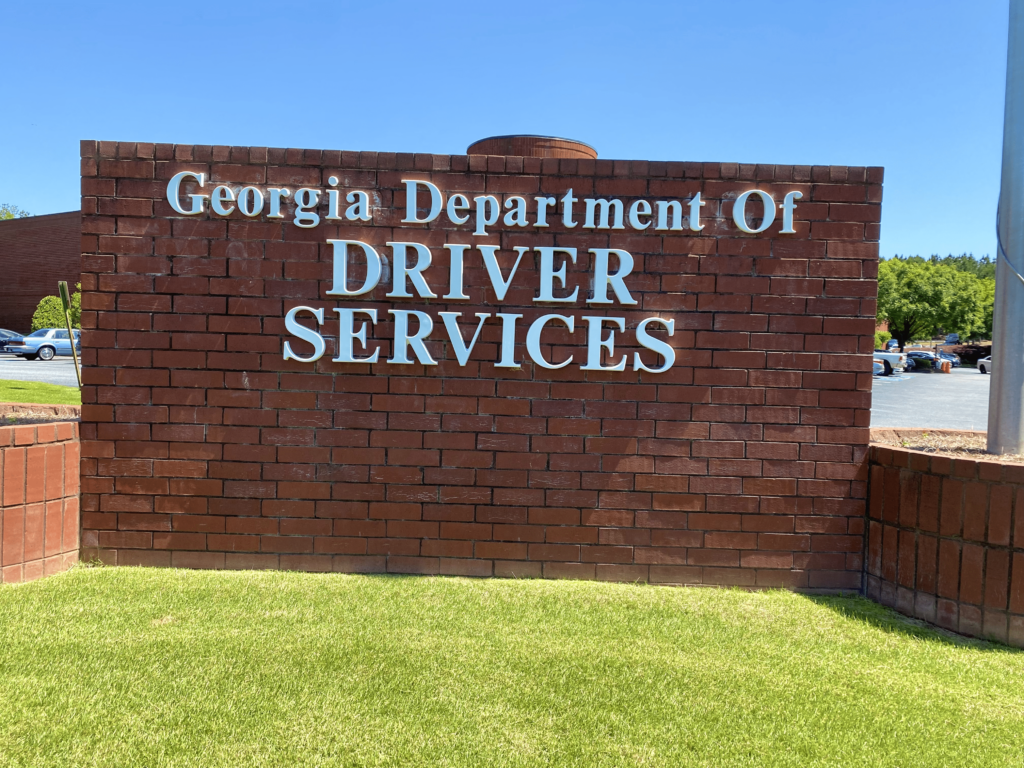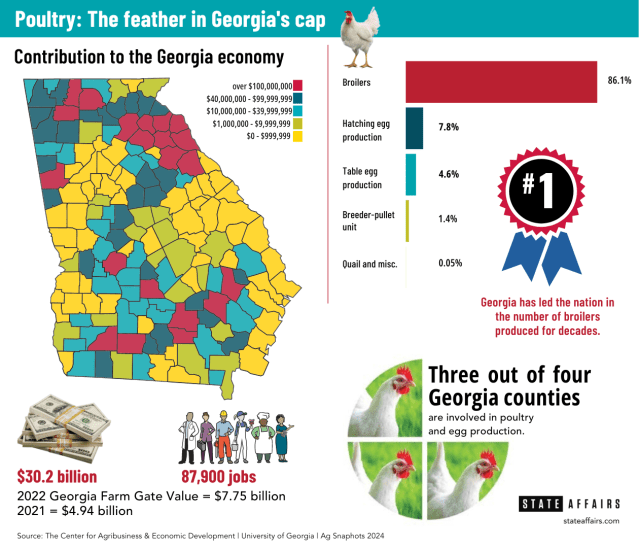Stay ahead of the curve as a political insider with deep policy analysis, daily briefings and policy-shaping tools.
Request a DemoNew Georgia Law Could Help 100,000 Drivers Avoid License Suspensions

Credit: Georgia Department of Driver Services
- More than one hundred thousand licenses are suspended each year in Georgia for missing traffic court.
- Many of the roughly fifty-thousand people arrested annually in Georgia for driving on suspended licenses lose their jobs as a result.
- A new state law aims to curb chances in Georgia for drivers to lose their license for missed fine payments.
The Gist
There’s less chance Georgians, and some visitors, may lose their driver’s licenses for failing to pay tickets for minor traffic infractions under a new law that gives judges more leeway in suspending licenses.
What’s Happening
Around 105,000 licenses are suspended each year in Georgia, according to the nonprofit Georgia Justice Project. Because many drivers have the option to simply pay a ticket instead of appear in court, those who cannot pay are disproportionately affected by this law.
Previously, state law automatically suspended a driver's license for "failure to appear" in court, and drivers could only get their license back after fully paying their fine. New law gives judges the power to stop a suspension from moving forward and reinstate a license at any time — even before payment is made.

This chart shows the number of speeding tickets issued in Georgia in recent years and how much revenue the state has collected from fines. (Credit: Beau Evans for State Affairs)
Coleen Shane, a 47-year-old network security engineer from San Diego, was driving through Georgia to visit her sister in September 2020 when she was pulled over for speeding. Months later, she was notified her California license had been suspended for “failure to appear” in Georgia – even though she says she paid a $200 fine online.
“There were some kind of additional fees that caused the suspension,” Shane said. “I got my license reinstated, but it could have totally affected my job since I travel a lot.”
Legislation signed into law by Gov. Brian Kemp earlier this month would curb chances for drivers like Shane to lose their license for missed fine payments. Sponsored by state Sen. Emanuel Jones (D-Decatur), the bill gives local judges the ability to halt license suspensions for minor traffic violations, rather than a suspension automatically taking effect.
“A driver’s license means a job,” said state Rep. Tyler Smith (R-Bremen), who carried Jones’ bill in the Georgia House of Representatives. “A lot of times [drivers] have to choose between going to court or losing a job. And sometimes, it’s just confusing.”
Why It Matters
Roughly half of Georgia drivers who lose their licenses also end up losing jobs because of not being able to drive to work or the stigma of having a court record, according to the Georgia Justice Project.
Even then, most drivers in Georgia with suspended licenses still hop in their cars to commute. Around 50,000 people are arrested annually in Georgia for driving on suspended licenses, according to the nonprofit.

Court-reform advocates stress not all those arrested for traffic violations are dangerous motorists. Take the case of 25-year-old Jasmin Sosa.
In 2015, Sosa received a nearly $300 ticket for speeding in North Georgia – a fine she struggled to pay on a $100 weekly salary. Two years later, she was pulled over for turning left at a right-only stop sign, arrested and jailed in DeKalb County for several hours until her mother posted bail. She had no idea her license was suspended from the 2015 speeding ticket.
“I’ve carried a lot of shame,” Sosa said. “My forgetfulness gets me in trouble.”
Sosa said she feels some cautious optimism with the new law, but her treatment by police and the court convinced her she was punished more for being forgetful than her original infraction. “I’d love to put this behind me,” she said, but her court record has often forced her to explain her arrest to roommates, employers and romantic partners.
“The system set me up for failure in a lot of ways,” Sosa said.
Jobs Impact
License suspensions most hurt Georgians who are already struggling, said Doug Ammar, the Georgia Justice Project’s executive director. Studies show that having a license can help workers on federal public aid hold down a job even more than a high-school diploma can.
“Having a driver's license is the most correlative thing to getting a job and keeping a job than any other data point in the country,” Ammar said. “It's almost essential if you want people to work and keep working.”

Doug Ammar is the executive director of the Georgia Justice Project. (Credit: Alessandro Marazzi Sassoon for State Affairs)
The new law won’t let every driver in Georgia off the hook for license suspensions. Serious violations – such as driving under the influence, drag racing or vehicular homicide – will still trigger an automatic suspension.
Georgia’s Department of Driver Services (DDS) also suspends licenses upon a judge’s orders when a parent required to pay child support fails to do so. Those suspensions would remain unchanged by the new law.
Judges could also carry out license suspensions if they find a driver to be a danger on the road, said Tony West, deputy state director of the nonprofit Americans for Prosperity. That leeway strikes a balance between penalizing reckless drivers and giving safe drivers a pass, he said.
"The point of the bill is to allow a judge to make that call,” West said. “You don't want the criminal justice system penalizing people and making it harder for them to be productive citizens if they're not a threat to public safety."
What’s Next?
It’s tough to forecast how often local judges will choose to halt license suspensions rather than let them take effect under the new law, said Bruce Shaw, a spokesman for the state Administrative Office of the Courts, which monitors local and state courts.
Georgia traffic courts already have communications systems for quickly conveying judges’ orders on license suspensions to the state DDS, Shaw said. DDS only yanks license privileges if a judge’s order requires a suspension, said Susan Sports, a DDS spokeswoman.

Ammar, of the Georgia Justice Project, said feedback he’s heard from many local judges and prosecutors who support the new law gives him confidence most courts will avoid automatic license suspensions for missed fine payments.
“Many of them didn't like [automatic suspensions],” Ammar said, referring to judges and prosecutors he’s spoken to about the new law. “They didn't like what it did to people, but they didn’t have another option.”
Going forward, court-reform groups like the Georgia Justice Project aim to push future legislation that would require fine notices to be sent via email or text messages. They also plan to pursue law changes that allow low-income traffic violators to do community service instead of paying steep fines, Ammar said.
“Poor folks often don't have the money [to pay fines],” Ammar said. “So they're left with this conundrum [that] leads to them not going back to court, and now the problems are all going downhill.”
Join the Conversation
For more info on what to do if your license is suspended for missing traffic court here.
What else do you want to know about court reforms and state government in Georgia? Share your thoughts/tips by emailing [email protected] or [email protected].
Correction: This story has been updated to clarify that people get an FTA for not appearing in court, not for just not paying. The links to Georgia Justice Project have been updated.
Read this story for free.
Create AccountRead this story for free
By submitting your information, you agree to the Terms of Service and acknowledge our Privacy Policy.
House speaker Jon Burns hires new communications director
House speaker Jon Burns, R-Newington, announced today that he has hired a new communications director. Kayla Roberson, who has served as press secretary at the Georgia Chamber for the past year or so, will now oversee all external communications, media relations and strategic messaging for Burns.
“I’m excited to welcome Kayla to our team,” Burns said in a statement. “Kayla has an excellent background, deep skill set and strong work ethic, and we’re excited to have her on board to continue getting our message out and sharing the House’s priorities ahead of and into the next session.”
A double major in political science and journalism at the University of Georgia, where she graduated in 2022, Roberson interned for U.S. Rep. Andrew Clyde, a Republican in north Georgia’s 9th Congressional District, and worked as a consultant for GOP political candidates before joining the Georgia Chamber.
“I’m beyond grateful for the opportunity to work under the leadership of speaker Burns,” Roberson told State Affairs. “Whether it’s improving education opportunities, putting money back in the pockets of hardworking Georgians, creating jobs or supporting our rural communities, speaker Burns always prioritizes doing what is best, and what is right, for Georgia.”
Political strategist Stephen Lawson, who has held the top communications role for the speaker since last December, announced he’s joining Dentons, where starting today he’ll lead the global law firm’s public affairs efforts.
Have questions or comments? Contact Jill Jordan Sieder on X @journalistajill or at [email protected].
Global bird flu disrupts Georgia exports, costing chicken producers millions
ATLANTA — A global bird flu that has rapidly spread from birds to dairy cows, milk supplies and humans has cost untold millions of dollars in lost export business in Georgia, the nation’s leading poultry producer, officials with the state Department of Agriculture and poultry industry said.
Georgia has had only three reported cases of H5N1 avian influenza since it reemerged in 2022. The last of those cases was resolved in November 2023 but ramifications of those outbreaks continue to have a big effect on the state’s ability to export chicken and chicken parts, such as chicken feet, to different countries, including China, one of Georgia’s biggest export markets for chicken feet.
In 2022, frozen chicken feet, for example, accounted for more than 85% of all U.S. poultry exported to China, according to Farm Progress, publisher of 22 farming and ranching magazines.
The $30 billion poultry industry is Georgia’s largest segment in its No. 1 industry — agriculture.

China has also placed a ban on the import of chicken products from 41 other American states. The ban on Georgia products went into effect Nov. 21, 2023. Efforts to reach the Chinese Embassy in Washington, D.C. were unsuccessful.
Georgia Poultry Federation President Mike Giles estimates the state’s loss at “well into the millions of dollars.”
“It’s a significant amount in a significant export market for us,” he said. “Poultry paws [feet] immediately lose value because of the loss of demand.”
The ban has forced Georgia poultry producers to find alternative markets for their products that would normally be headed to China.
“Some are sold domestically, some are frozen and stored, hopefully to find markets later on, and some go to other countries,” Giles said.
This isn’t the first time China has banned U.S.-produced poultry products due to a bird flu outbreak. The country instituted a ban in January 2015 which lasted until November 2019 — even though U.S. poultry products were deemed free of the disease by August 2017.
After that ban was lifted, China’s appetite for American-produced chicken products became voracious.
In 2022, U.S. producers shipped nearly $6 billion in poultry meat and related products (excluding eggs) to over 130 countries. China has emerged as the second largest destination for U.S. poultry exports, increasing from $10 million in 2019 to a record $1.1 billion in 2022, according to Southern Ag Today.
Chicken paws, for instance, are eaten in many Asian countries, including the Philippines, Thailand, Indonesia and Korea.They can also be found on Chinese dim sum menus throughout the U.S. and are also popular in Jamaica, Trinidad, Russia and Ukraine in everything from soups and curries to fried snacks.
Three Georgia counties have reported H5N1 outbreaks since 2022. The most recent case was late last year. Henry, Sumter and Toombs counties each reported one case of H5N1 bird flu. Those outbreaks are resolved, poultry and state agriculture officials say.
“When HPAI cases are found in any state, that state is given a designation that could lead to foreign countries halting trade on poultry products from that state,” Georgia Department of Agriculture spokesman Matthew Agvent told State Affairs.
Not since 2016 has the United States experienced such a fast-moving case of the H5N1 avian influenza. In the last two months, the virus has spread in parts of the United States from birds to dairy cows, some milk supplies and humans. Two people — a Texas dairy worker and a prison inmate in Colorado who was killing infected birds at a poultry farm — are reported to have caught the virus, according to news reports. The outbreak is the largest in recent history, impacting both domestic poultry and livestock as well as wild birds and some mammal species.
State officials are continuing to monitor the national outbreak and its impact on Georgia.

Georgia’s poultry & egg industry: At A Glance
Annual economic impact: $30.2 billion
Percentage of the Agriculture industry: 58% *
Jobs: 87,900
Counties involved in poultry & egg production: 3 out of 4
National ranking in chicken broiler production: No. 1
Daily production of table eggs: 7.8 million
Daily production of hatching eggs: 6.5 million
Pounds of chicken produced daily: 30.2 million
Pounds of chicken produced annually: 8 billion
Number of chicken broilers processed each day: 5 million
Counties involved in poultry & egg production: 3 out of 4
Source: Georgia Poultry Federation; The Center for Agribusiness & Economic Development, University of Georgia, Ag Snapshots 2024; Georgia Poultry Federation.
Have questions? Contact Tammy Joyner on X @lvjoyner or at [email protected].
Is it safe to eat chicken and eggs and drink milk? Answers to your most pressing questions about the latest bird flu outbreak
A two-year-old strain of bird flu has heightened concerns in Georgia and the rest of the country after the virus recently spread to dairy cows. Here’s what you need to know about the virus and its impact on Georgia and the rest of the country. What are the symptoms of this flu in humans? Eye …
Kemp signs bills on education, health care, taxes
Gov. Brian Kemp signed a slew of bills over the past week or so, including the private school voucher bill long sought by Republicans and a bill that will ease regulations over the construction and expansion of medical facilities in rural areas.
His bill-signing events were clustered into themes: education, health care, military members, human trafficking and Georgia’s coastal communities.
Education
Among the education-related bills Kemp signed was Senate Bill 233, also known as the Georgia Promise Scholarship Act, which provides the families of Georgia students enrolled in underperforming school districts with $6,500 scholarships that can be used toward private school or homeschooling expenses, including tuition, fees, textbooks and tutoring.
“Georgia is affording greater choice to families as to how and where they receive their education, while also continuing our efforts to strengthen public schools, support teachers, and secure our classrooms,” Kemp said, and thanked leadership in the House and Senate for prioritizing passage of the bill, which had failed in a close vote in 2023.
Democrats and many public education advocates who opposed the bill argued it will drain resources from public schools and primarily benefit students from wealthy families.
Kemp also signed Senate Bill 351, sponsored by nine Republican senators, which will require social media companies, as of July 1, 2025, to verify their users are at least 16 years old unless they receive approval from a parent.
House Bill 409, sponsored by Rep. Lauren Daniel, R-Locust Grove, directs school systems to consider not having bus stops where a student would have to cross a roadway with a speed limit of 40 mph or greater. The bill also increases the penalty for passing a stopped school bus to $1,000 from $250.
Kemp noted that Ashley Pierce, the mother of Addy Pierce, an 8-year-old who was fatally struck by a motorist as she boarded her school bus, “passionately advocated for and was instrumental in the passage of this legislation.”
Senate Bill 395, sponsored by Sen. Clint Dixon, R-Gwinnett, states that no school visitor or personnel can be prohibited from possessing an opioid reversal drug such as Narcan and directs schools to maintain a supply. It also allows opioid antagonists to be sold in vending machines and directs certain government buildings to maintain a supply of at least three doses.
Senate Bill 464, also sponsored by Dixon, creates the School Supplies for Teachers Program to financially and technically support teachers purchasing school supplies online. It also creates an executive committee of five voting members within the Georgia Council on Literacy and limits the number of approved literacy screeners to five, one of whom must be available to schools for free.
Health care
The governor chose his hometown of Athens as the venue to sign several bills aimed at improving health care in rural and underserved communities.
Among them was House Bill 1339, sponsored by Rep. Butch Parrish, R-Swainsboro, which revises the Certificate of Need process by which the state determines if and how new medical facilities can be built or expanded. The bill provides for several new exemptions, including psychiatric or substance abuse inpatient programs, basic perinatal services in rural counties, birthing centers and new general acute hospitals in rural counties. It also raises the total limit on tax credits for donations to rural hospital organizations to $100 million from $75 million.
Senate Bill 480, sponsored by Sen. Mike Hodges, R-Brunswick, establishes student loan repayments for mental health and substance use professionals serving underserved youth in the state or in unserved geographic areas disproportionately impacted by social determinants of health.
House Bill 872, sponsored by Rep. Lee Hawkins, R-Gainesville, chair of the House Health and Human Services Committee, expands cancelable loans for certain health care professionals to dental students who agree to practice in rural areas.
Senate Bill 293, sponsored by Sen. Ben Watson, R-Savannah, chair of the Senate Health and Human Services Committee, reorganizes county boards of public health and opens the qualifications for the CEO of each county board of health to include either licensed physicians or people with a master’s degree in public health or a related field.
Military members and veterans
Kemp on Wednesday focused on bills to improve military recruitment and provide more work opportunities for veterans and military family members.
House Bill 880, sponsored by Rep. Bethany Ballard, R-Warner Robins, allows spouses of military service members to work under a license they hold in good standing in another state while under the supervision of an existing Georgia medical facility or provider.
Senate Bill 449, sponsored by Sen. Larry Walker, allows military medical personnel to practice for 12 months while a license application is pending, including working as a certified nursing aide, certified emergency medical technician, paramedic or licensed practical nurse. The bill also creates a new advanced practice registered nurse license and makes it a misdemeanor to practice advanced nursing without a license.
Human trafficking
The governor on Wednesday was accompanied by first lady Marty Kemp and other members of the GRACE Commission for the signing of an anti-human trafficking package. It includes Senate Bill 370, which adds certain businesses to the list of organizations that must post human trafficking notices, including convenience stores, body art studios, businesses that employ licensed massage therapists and manufacturing facilities.
Sponsored by Sen. Mike Hodges, R-Brunswick, the bill also allows the Georgia Board of Massage Therapy to initiate inspections of massage therapy businesses and educational programs without notice and requires massage therapy board members to complete yearly human trafficking awareness training.
House Bill 993, sponsored by Rep. Alan Powell, R-Hartwell, creates the felony offense of grooming of a minor and creates new penalties for offenses relating to visual mediums depicting minors engaged in sexually explicit conduct.
House Bill 1201, sponsored by Rep. Houston Gaines, R-Athens, allows human trafficking survivors who received first offender or conditional discharge status to vacate that status for certain crimes, as long as the crime was a direct result of being a victim of human trafficking.
Coastal communities
Earlier today in Brunswick, Kemp signed legislation impacting Georgia coastal communities, including House Bill 244, which amends the laws around how wild game can be hunted and how seafood dealers operate, and House Bill 1341, which designates white shrimp as the state’s official crustacean.
Taxes
Earlier this month Kemp signed several bills related to taxation, including House Bill 1015, sponsored by Rep. Lauren McDonald, R-Cumming, which lowers the state income tax for tax year 2024 to 5.39%, accelerating a multiyear drop in state income taxes that started at 5.75% in 2023 and will continue through 2029.
The Governor’s Office of Planning and Budget estimates the tax cut acceleration will save Georgia taxpayers approximately $1.1 billion in calendar year 2024 and about $3 billion over the next 10 years.
Kemp also signed House Bill 1021, sponsored by Rep. Lauren Daniel, R-Locust Grove, which increases the state’s income tax dependent exemption to $4,000 from $3,000.
House Bill 581, sponsored by Reps. Shaw Blackmon, R-Bonaire, and Clint Crowe, R-Jackson, enables a constitutional amendment (House Resolution 1022) to let voters decide whether counties can provide a statewide homestead valuation freeze, which limits the increase in property values to the inflation rate.
The governor has until May 7 to sign or veto bills passed during the legislative session that ended on March 28. Those he takes no action on will automatically become law.
Legislation signed by Kemp is posted on the governor’s website.
Read these related stories:
Have questions, comments or tips on education in Georgia? Contact Jill Jordan Sieder on X @journalistajill or at [email protected].
Facebook @STATEAFFAIRSGA
Instagram @STATEAFFAIRSGA
LinkedIn @STATEAFFAIRS




